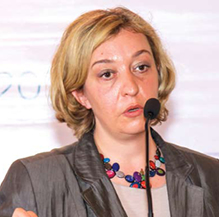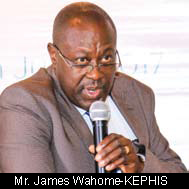 Mr. Charles Ongwae from the Kenya Bureau of Standards (KEBS) informed the conference that the role of Kenya Bureau of Standards is to develop standards in commerce and industry and in that regard; KEBS has worked with Kenya Flower Council (KFC), Fresh Producer Exporters Association of Kenya (FPEAK) and other key stakeholders to revise KS1758. He encouraged all producers to implement standards to help them in planning, to improve their operational efficiencies and for cutting down costs. He said KEBS works with flower producers to protect the consumer from exposure to certain chemicals which might be dangerous to their health. He encouraged the producers to embrace KS1758 in order to become more effective and efficient in their businesses.
Mr. Charles Ongwae from the Kenya Bureau of Standards (KEBS) informed the conference that the role of Kenya Bureau of Standards is to develop standards in commerce and industry and in that regard; KEBS has worked with Kenya Flower Council (KFC), Fresh Producer Exporters Association of Kenya (FPEAK) and other key stakeholders to revise KS1758. He encouraged all producers to implement standards to help them in planning, to improve their operational efficiencies and for cutting down costs. He said KEBS works with flower producers to protect the consumer from exposure to certain chemicals which might be dangerous to their health. He encouraged the producers to embrace KS1758 in order to become more effective and efficient in their businesses.
Mr. James Wahome from the Kenya Plant and Health Inspectorate Service (KEPHIS) told the conference that all standards applied in the country are found in Cap 319 of the Agricultural Export Act of the Kenyan Laws. He reminded participants that different countries have different laws that govern the import of goods into their countries. He urged the sector players to always consult with KEPHIS in order to keep abreast with the standards and the requirements that are necessary. He spoke of challenges that exporters are likely to encounter like interceptions in the international market, and inconsistencies in rules which keep changing, especially in the EU market. He said that market access is a dynamic function that also keeps changing with changes in technology.
He challenged the stakeholders to keep abreast with the ever evolving technology. Market intelligence and changing preferences in different market segments is something they also need to keep updating themselves on. He urged the sharing of information in order to enhance trade in the world market.

Mr. Jeroen Oudheusden of Floriculture Sustainability Initiative (FSI) took growers through 14-baskets of standards that FSI has developed in the area of environmental, social or a combination of both, which they use to help create a sustainable supply chain that meets the demands of consumers.
The standards emphasize on transparency and it is also a competitive market driven initiative that involved many stakeholders in its development. FSI is made up of 35 members who can measure their performance against the standards in FSI.
Mr. Richard Fox from KFC said the Kenya Flower Council Silver standard has become truly internationalized and has emerged as a leading world standard. He urged Kenyan exporters to sell it to their customers since it meets more than the certification requirements of the producers.
Ultimately, he said, adoption of KFC silver as the preferred standard for products from Kenya will avoid duplication and reduce business costs.
He said that having an internationally recognized industry standard will go a long way to establish a Kenya brand of sustainably-produced flowers in a market where the reputation for quality is highly regarded. He said the industry would like to see compliance with KS1758 established through a comprehensive third-party audit as a mandatory requirement for one to be issued with an export license. This will protect the industry as a whole, and create uniformity and sustainable practices that will make the Kenyan brand to stand out in the market.
 Responding to concerns from participants, Mr. Ongwae said that the East African Community countries that produce flowers have harmonized their standards with regard to export from one country to another. He assured the meeting that flowers that are being exported within the region meet the requirements as prescribed by standards and / or technical regulations. KEBS encourages regulators in various sectors to reference standards like KS1758 while developing their technical regulations.
Responding to concerns from participants, Mr. Ongwae said that the East African Community countries that produce flowers have harmonized their standards with regard to export from one country to another. He assured the meeting that flowers that are being exported within the region meet the requirements as prescribed by standards and / or technical regulations. KEBS encourages regulators in various sectors to reference standards like KS1758 while developing their technical regulations.
Mr. Fox revealed that most businesses now have committees through which they relay important information to workers, for instance information on standards and other processes that affect workers. He said KFC was working hard to see that KS1758 becomes mandatory before the end of the year. KFC said it is working with BSR to improve the well-being of workers – not just the environment in which they work, but also on their self-esteem, and it encourages them to develop themselves. It says this has already had a lot of positive impact in the work place.
Mr. Jeroen said his organization exists to help users from different environments to comply with market regulations and this differs from place to place and from production to production e.g. in an open-field production or in a closed green house. Jeroen said that because of the imbalance that exists in policies in different countries, there is need to use a multi-stakeholder approach to deal with the challenges. Ms. Sylvia Mamias from Union Fleurs said there was need for more concerted engagement between the private sector and other stakeholders to secure market access and thus secure the future of businesses.
